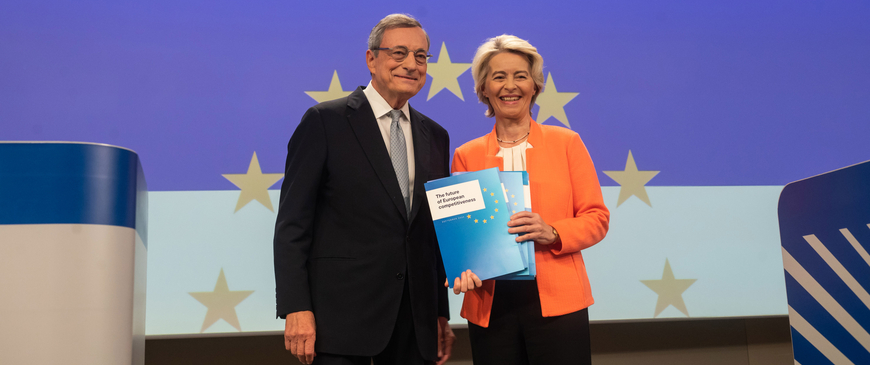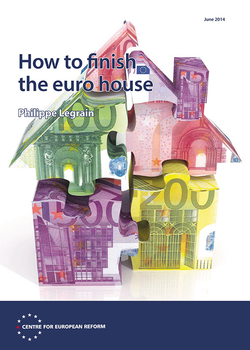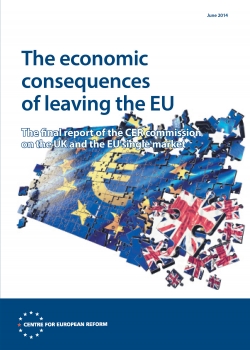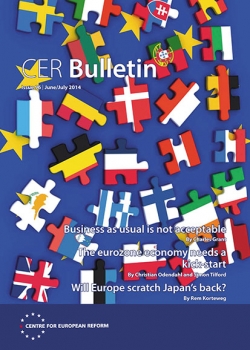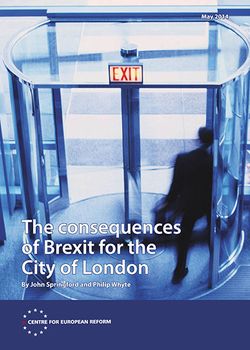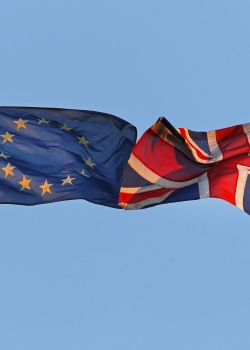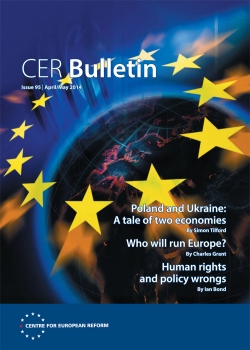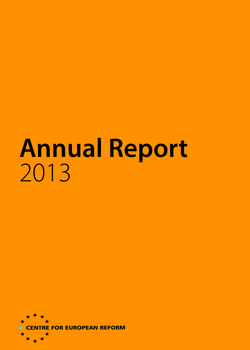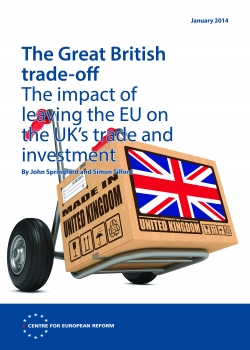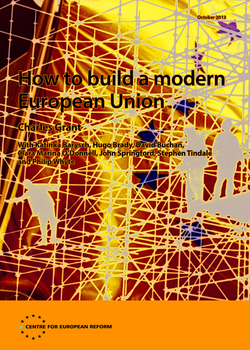Single market, competition & trade
How to finish the euro house
17 June 2014
Eurozone governance is politically unsustainable: its rules and institutions favour creditor over debtor countries. Eurozone policy-makers need to change direction before it is too late.
More investment, for Germany’s sake
13 June 2014
German investment is low while German borrowing costs are at record lows. Convincing the German government to invest will not be easy, for political reasons.
The economic consequences of leaving the EU
09 June 2014
A group of experts finds that, after leaving the EU, the UK would face an invidious choice: sign up to the single market’s rules, or suffer economic damage.In April 2016 an updated version of the report The economic consequences of leaving the EU: The final report of the CER commission on Brexit 2016 was published.
Issue 96 - 2014
06 June 2014
- Business as usual is not acceptable, Charles Grant
- The eurozone economy needs a kick-start, Christian Odendahl, Simon Tilford
- Will Europe scratch Japan's back?, Rem Korteweg
The eurozone economy needs a kick-start
06 June 2014
With just as many reasons for pessimism as for optimism in the eurozone, policy-makers need to further stimulate demand and pursue more targeted reforms.
Presidential candidates, European federalism and Tony Giddens
15 May 2014
The problem with ‘federalism’ is that most European citizens do not want it. This makes the federalist proposals in Tony Giddens’ new book unrealistic.
The consequences of Brexit for the City of London
08 May 2014
If Britain leaves the EU, the City of London will lose access to European markets – unless the UK aligns its financial rules with those of the EU.
Quantitative easing alone will not do the trick
28 April 2014
In the eurozone, quantitative easing by itself is unlikely to be effective. The European Central Bank needs to change the way it manages people’s expectations, too.
Why a British exit is not inevitable
17 April 2014
Lord Ashcroft’s polling shows that pro-Europeans can win an in/out referendum. But what are the best arguments to use in such a campaign?
Issue 95 - 2014
31 March 2014
- Poland and Ukraine: A tale of two economies, Simon Tilford
- Who will run Europe?, Charles Grant
- Human rights and policy wrongs, Ian Bond
Poland and Ukraine: A tale of two economies
31 March 2014
The EU finally needs to fulfil its moral obligation to Ukraine: to treat it like any other sovereign country trying to escape Russia's grasp.
The eurozone's ruinous embrace of 'competitive devaluation'
10 March 2014
Instead of being criticised for pursuing competitive devaluations, eurozone countries that manage to devalue their real exchange rates are extolled as an example for others.
French federalists propose a Euro Community
03 March 2014
A group of French thinkers wants to establish a federal 'Euro Community'. Their scheme could harm the single market and make Britain's position in the EU uncomfortable.
Annual report 2013
10 February 2014
Charles Grant discusses the challenges facing the EU in 2014, such as the European elections, Britain's slide towards the exit and the continuing travails of the eurozone.
What explains Europe's rejection of macroeconomic orthodoxy?
05 February 2014
European policy-makers' rejection of both Keynesianism and monetarism has cut economic growth, raised debt and increased the risk of deflation.
The Great British trade-off: The impact of leaving the EU on the UK's trade and investment
20 January 2014
Eurosceptics think Britain can leave the EU and still have access to its markets. But to do so, Britain will have to sign up to EU rules.
Why Germany’s trade surplus is bad for the eurozone
29 November 2013
In late October, the US singled out Germany as a threat to the global economy. The Treasury issued a report saying that Germany’s current account surplus – now around 7 per cent of GDP – imposes "a deflationary bias for the eurozone as well as for the world economy."
How to build a modern European Union
10 October 2013
The CER proposes reforming the EU’s policies and institutions, to foster a more dynamic European economy and to make decision-making more accountable.
Eurozone recovery: The world is not enough
04 October 2013
The eurozone is too big to rely on exports for economic growth. It needs policies suited to a large continental economy, not ones perfected by Germany.
What would a Brexit mean for EU competition policy?
30 September 2013
A British exit from the EU could have important repercussions for competition policy. Britain and the remaining EU countries would both be affected.





